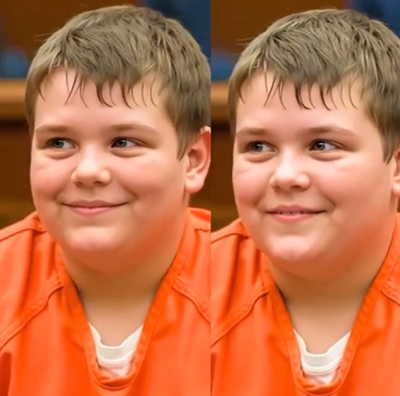Cedar Falls, Iowa — On the crisp morning of October 15th, everything in town felt perfectly ordinary. The streets were calm, the coffee shops were filling with regulars, and the soft hum of autumn carried through the air. But by nightfall, Cedar Falls would lose its sense of calm — and the face of a
Instead, he sat in front of Judge Patricia Weller, legs too short to touch the floor, his expression unreadable — except for that faint, defiant smirk. That same look would soon define him in the eyes of an entire community. Three weeks earlier, Ethan had joined two older teens —
In a moment of panic, Ethan picked up a decorative rock from a shelf and hurled it. It struck Harold in the face, knocking him unconscious. The injury wasn’t fatal — Harold survived — but the shock and trauma rippled through the quiet town. As the details surfaced, outrage followed. The town couldn’t comprehend how a
Ethan shrugged. “Guess so.” And when asked if he had anything to say to Harold, he replied flatly, “He shouldn’t have tried to stop us.” The words landed like a slap. Gasps filled the courtroom. Ethan’s mother,
The sound of the gavel echoed sharply. Ethan Morales was sentenced to six months in juvenile detention. For the first time, the smirk vanished. Inside the Cedar Valley Juvenile Detention Center
It was there that he met Marcus, a 15-year-old inmate with a quiet confidence and a reputation for leadership. Marcus had been inside for nearly a year, serving time for theft. One night, after lights-out, he said to Ethan:
“You’re not tough, man. None of us are. The real challenge isn’t surviving in here — it’s figuring out who you want to be when you get out.”
Those words stuck. Ethan began paying attention in class, particularly to
Then came an assignment that would change everything: “Write a letter to your victim.” Ethan stared at the blank page for hours. Finally, his pen moved.
“I know sorry doesn’t fix anything.
But I think about what I did every day.
You were in your own home, and I hurt you.
I acted like it didn’t matter — but it did.
I don’t expect forgiveness. I just want you to know I’m not that same kid anymore.”
Mrs. Campbell read the letter silently, then nodded. “Send it,” she said. He did. Weeks passed. There was no reply. But the act of writing — of taking responsibility — began to change something inside him. Six months later, Ethan stood once again in
Back home, things weren’t easy. Some neighbors refused to make eye contact. Others whispered as he walked by. But a few people — including Mrs. Campbell — stood by him. Ethan began volunteering at the
Their eyes met. Ethan hesitated, tray in hand. “Mr. Kensington,” he said softly. “I’m sorry.” Harold looked at him — really looked — and replied, “What you did was wrong. But trying to make it right — that matters.” Ethan nodded, tears forming but unspoken. Two years later, at his
When it was Ethan’s turn to speak, his voice carried across the room with quiet confidence. “My mistake is part of my story,” he said, “but it’s not the only part.” This time, there was no smirk — only a sincere, steady smile. And for the first time,








